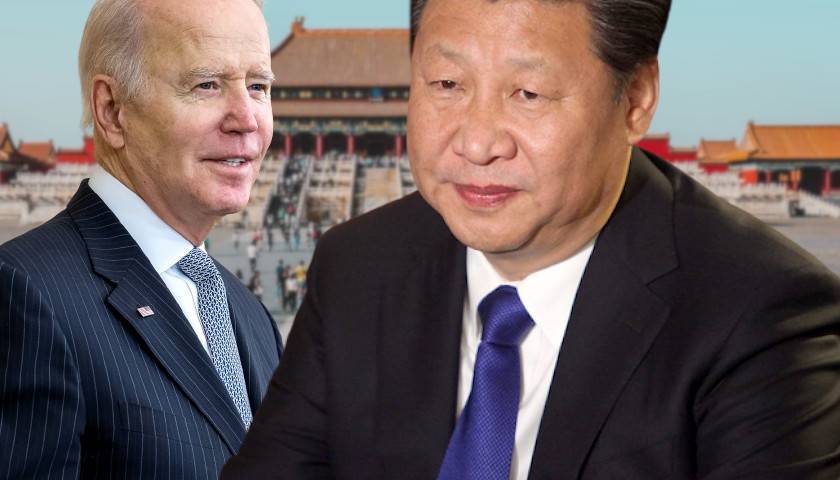by Victor Davis Hanson
Imagine if the United States treated China in the same way it does us?
What if American companies simply ignored Chinese copyrights and patents, and stole Chinese ideas, inventions, and intellectual property, as they pleased and with impunity?
What if the American government targeted Chinese industries by dumping competing American export products at below the cost of production—to bankrupt Chinese competitors and corner their markets?
What would the communist Chinese government do if a huge American spy balloon lazily traversed continental China—sending back to the United States photographic surveillance of Chinese military bases and installations?
How would China react to American stonewalling any explanation, much less refusing to apologize for such an American attack on Chinese sovereignty?
Envision a U.S. high-security virology lab in the Midwest, run by the Pentagon, allowing the escape of an engineered, gain-of-function deadly virus.
Instead of enlisting world cooperation to stop the spread of the virus, the American government would lie that it sprung up from a local bat or wild possum.
Washington would then make all its relevant military scientists disappear who were assigned to the lab, while ordering a complete media blackout.
America would forbid Chinese scientists from contacting their American counterparts involved in the lab, despite the deaths of more than 1 million Chinese from the American-manufactured disease.
And what if during the first days of the pandemic Washington had quietly prevented all foreign travel to the United States, while keeping open one-way direct flights from America to major Chinese cities?
How would Beijing respond if American biotech company warehouses were discovered in rural China with unsecured vials of deadly viruses and pathogens?
Would China be angered that it was never notified by an American company that it had left abandoned COVID and HIV viruses and malaria parasites in its facilities—along with rotting genetically engineered dead rats littering the floors with hundreds more lab animals abandoned in laboratory cages?
What would Chairman Xi Jinping have done if American-made fentanyl was shipped in massive quantities to nearby Tibet on the Chinese border? And what if it would be deliberately repackaged there as deceptive recreational drugs and smuggled into China, where it annually killed 100,000 Chinese youth, year after year?
What if 10,000 Americans this year illegally crossed the Indian border into China and disappeared into its interior?
What if an allied Asian nation—such as South Korea, Japan, or Taiwan—went nuclear. And what if, in North-Korean style, it serially blustered to send one of its nuclear missiles into the major cities of China?
What if almost monthly China discovered an American military operative teaching incognito at a major Chinese university or among the ranks of the Chinese People’s Liberation Army?
Would China object if an American femme fatale agent was sleeping with a high-ranking Chinese official of the Chinese communist politburo?
Or what if one of the chauffeurs of its top ranking Chinese officials was a nearly two-decade-long American agent?
What would be the Chinese reaction if there were 350,000 American students attending schools all over the Chinese nation, with perhaps 3,000-4,000 of them actively engaged in national security espionage on behalf of the United States?
These “what-ifs” could be expanded endlessly. But they reflect well enough the great asymmetry in the bizarre Chinese-American relationship.
Obviously, China would not tolerate America treating it as it does the Americans.
Why then does the imbalance continue?
Do naïve Americans believe that the more China is indulged, the more it will respond in kind to American magnanimity?
Does the United States believe that the more China is exposed to our supposedly radically democratic and free culture, the sooner it will become a good democratic citizen of the global community?
Are we afraid of China, because it has four times our population, and believes its economy and military will overtake ours in a decade?
Are we terrified that its ruthless Chinese government is completely amoral, utterly ruthless, and capable of anything?
Or are our political, cultural, and corporate elites so compromised by their lucrative Chinese investments and joint ventures, that they prioritize profits over their own country’s national security and self-interest?
And did the Biden family—including President Joe Biden himself—in the past receive millions of dollars from Chinese energy and investment interests?
Did Hunter Biden’s quid pro quo decade of grifting result in millions in Chinese money filling the Biden family coffers—all in exchange for the current Biden and past Obama administrations going soft on Chinese aggression?
No one seems able to explain the otherwise inexplicable.
But one way to get along with China, and to regain its respect is to deal with it exactly the way it deals with the United States.
Anything less, and America will continually be treated with even more Chinese contempt—and eventually extreme violence.
– – –
Victor Davis Hanson is a distinguished fellow of the Center for American Greatness and the Martin and Illie Anderson Senior Fellow at Stanford University’s Hoover Institution. He is an American military historian, columnist, a former classics professor, and scholar of ancient warfare. He has been a visiting professor at Hillsdale College since 2004.
Photo “Xi Jinping” by Foreign, Commonwealth & Development Office. CC BY 2.0. Photo “Joe Biden” by Joe Biden.




